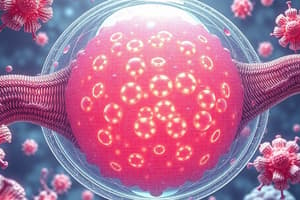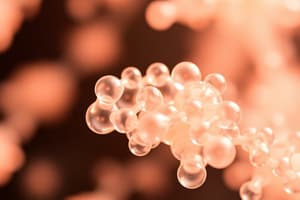Podcast
Questions and Answers
What are primary metabolites, and why are they essential during the growth phase of cells?
What are primary metabolites, and why are they essential during the growth phase of cells?
Primary metabolites are essential compounds such as amino acids and vitamins synthesized by cells during their growth phase, crucial for their growth and development.
List two examples each of sugars and vitamins that are commonly used in growth media for mammalian cells.
List two examples each of sugars and vitamins that are commonly used in growth media for mammalian cells.
Examples of sugars include glucose and lactose; examples of vitamins include ascorbic acid and thiamine.
Describe the lag phase of bacterial growth during fermentation.
Describe the lag phase of bacterial growth during fermentation.
The lag phase is when bacteria do not divide but adapt to the growth conditions in the medium, preparing for subsequent growth.
What occurs during the stationary phase of bacterial growth?
What occurs during the stationary phase of bacterial growth?
Identify the trace minerals necessary for mammalian cell growth, and explain their role.
Identify the trace minerals necessary for mammalian cell growth, and explain their role.
What is the primary source for the production of biopharmaceutical products as of 2010?
What is the primary source for the production of biopharmaceutical products as of 2010?
Identify the three classifications of bioreactor systems based on capacity.
Identify the three classifications of bioreactor systems based on capacity.
How long do cultured cells remain in bioreactors during continuous processes?
How long do cultured cells remain in bioreactors during continuous processes?
What happens to the reactor after the biochemical conversions in batch processes?
What happens to the reactor after the biochemical conversions in batch processes?
What is the purpose of the starting material and cells in bioreactors?
What is the purpose of the starting material and cells in bioreactors?
What percentage of the 58 biopharmaceutical products were produced in E. coli from 2006 to 2010?
What percentage of the 58 biopharmaceutical products were produced in E. coli from 2006 to 2010?
Which type of bioreactor system is used for small-scale experimentation?
Which type of bioreactor system is used for small-scale experimentation?
In large-scale manufacturing, what is the role of fermenters?
In large-scale manufacturing, what is the role of fermenters?
What type of bioreactor system is defined by a capacity greater than 50,000 L?
What type of bioreactor system is defined by a capacity greater than 50,000 L?
What is the significance of having fermentation or bioreactor processes in biotechnology?
What is the significance of having fermentation or bioreactor processes in biotechnology?
What is biotechnology and how does it utilize living organisms for production processes?
What is biotechnology and how does it utilize living organisms for production processes?
Explain the role of genetic engineering in modifying organisms and provide an example.
Explain the role of genetic engineering in modifying organisms and provide an example.
What are recombinant proteins and why are they significant in biotechnology?
What are recombinant proteins and why are they significant in biotechnology?
Describe the process through which recombinant proteins are produced using a common bacterium.
Describe the process through which recombinant proteins are produced using a common bacterium.
When was the first recombinant protein used in treatment and what was it?
When was the first recombinant protein used in treatment and what was it?
What impact has the recombinant protein industry had since its inception?
What impact has the recombinant protein industry had since its inception?
Identify two applications of biotechnology in the production of valuable substances.
Identify two applications of biotechnology in the production of valuable substances.
What are some drawbacks of using animal sources for protein pharmaceuticals?
What are some drawbacks of using animal sources for protein pharmaceuticals?
List the first two steps involved in recombinant protein production.
List the first two steps involved in recombinant protein production.
What is the significance of integrating the recombinant vector into the host cell?
What is the significance of integrating the recombinant vector into the host cell?
Identify one potential contaminant that may need to be removed in downstream processing.
Identify one potential contaminant that may need to be removed in downstream processing.
Why is the choice of expression systems important in biotechnology?
Why is the choice of expression systems important in biotechnology?
What type of cultivation system is typically used for large-scale recombinant protein production?
What type of cultivation system is typically used for large-scale recombinant protein production?
What role does the culture medium play in recombinant protein production?
What role does the culture medium play in recombinant protein production?
What is downstream processing in biotechnology?
What is downstream processing in biotechnology?
What is one of the major benefits of recombinant protein production compared to traditional methods?
What is one of the major benefits of recombinant protein production compared to traditional methods?
What is the doubling time of E. coli under optimal conditions?
What is the doubling time of E. coli under optimal conditions?
List one significant advantage of using mammalian cells in biotechnology.
List one significant advantage of using mammalian cells in biotechnology.
Name one limitation of using mammalian expression systems in industrial applications.
Name one limitation of using mammalian expression systems in industrial applications.
What type of host organism is E. coli classified as?
What type of host organism is E. coli classified as?
What does 'scalability' refer to in the context of mammalian cell use in biotechnology?
What does 'scalability' refer to in the context of mammalian cell use in biotechnology?
Identify the most commonly used host cell line for therapeutic protein production.
Identify the most commonly used host cell line for therapeutic protein production.
Explain one reason why rich complex media are advantageous for E. coli cultivation.
Explain one reason why rich complex media are advantageous for E. coli cultivation.
What is the main advantage of plasmid transformation in E. coli?
What is the main advantage of plasmid transformation in E. coli?
Why might potential contamination with animal viruses be a concern in mammalian expression systems?
Why might potential contamination with animal viruses be a concern in mammalian expression systems?
Mention one reason why proteins produced in mammalian cells are preferred in human applications.
Mention one reason why proteins produced in mammalian cells are preferred in human applications.
Flashcards
What is Biotechnology?
What is Biotechnology?
A field that combines natural and engineering sciences to use living organisms for products and services. It involves using bacteria, yeast, etc., to perform specific tasks or create valuable substances.
What is Genetic Engineering?
What is Genetic Engineering?
Modifying the genetic makeup of organisms (like adding genes) to create new traits or change existing ones.
What are Recombinant Proteins?
What are Recombinant Proteins?
Proteins artificially produced using genetic engineering techniques. They are used in research and as drugs.
How are Recombinant Proteins produced?
How are Recombinant Proteins produced?
Signup and view all the flashcards
What was the first recombinant protein used in treatment?
What was the first recombinant protein used in treatment?
Signup and view all the flashcards
How many recombinant proteins are approved by the US FDA?
How many recombinant proteins are approved by the US FDA?
Signup and view all the flashcards
What is the significance of recombinant proteins in biotechnology?
What is the significance of recombinant proteins in biotechnology?
Signup and view all the flashcards
What are primary metabolites?
What are primary metabolites?
Signup and view all the flashcards
What is the 'Log Phase' in cell growth?
What is the 'Log Phase' in cell growth?
Signup and view all the flashcards
What happens during the 'Stationary Phase' of bacterial growth?
What happens during the 'Stationary Phase' of bacterial growth?
Signup and view all the flashcards
What factors are necessary for mammalian cell growth?
What factors are necessary for mammalian cell growth?
Signup and view all the flashcards
What is the 'Death Phase' in bacterial growth?
What is the 'Death Phase' in bacterial growth?
Signup and view all the flashcards
Prokaryotic Host Cells
Prokaryotic Host Cells
Signup and view all the flashcards
Eukaryotic Host Cells
Eukaryotic Host Cells
Signup and view all the flashcards
E. coli Advantages
E. coli Advantages
Signup and view all the flashcards
Mammalian Cell Advantages
Mammalian Cell Advantages
Signup and view all the flashcards
Mammalian Cell Disadvantages
Mammalian Cell Disadvantages
Signup and view all the flashcards
CHO Cells
CHO Cells
Signup and view all the flashcards
Post-Translational Modification
Post-Translational Modification
Signup and view all the flashcards
Glycosylation
Glycosylation
Signup and view all the flashcards
Phosphorylation
Phosphorylation
Signup and view all the flashcards
Protein Folding
Protein Folding
Signup and view all the flashcards
What are bioreactors?
What are bioreactors?
Signup and view all the flashcards
How are bioreactors classified by size?
How are bioreactors classified by size?
Signup and view all the flashcards
What are the three main types of bioreactor processes?
What are the three main types of bioreactor processes?
Signup and view all the flashcards
What are batch processes like?
What are batch processes like?
Signup and view all the flashcards
What are continuous processes like?
What are continuous processes like?
Signup and view all the flashcards
What are fed-batch processes like?
What are fed-batch processes like?
Signup and view all the flashcards
What are mammalian cells used for in biotechnology?
What are mammalian cells used for in biotechnology?
Signup and view all the flashcards
Why are mammalian cells preferred for protein production?
Why are mammalian cells preferred for protein production?
Signup and view all the flashcards
What are some other types of cells used for protein production?
What are some other types of cells used for protein production?
Signup and view all the flashcards
What is the current trend in biotechnological protein production?
What is the current trend in biotechnological protein production?
Signup and view all the flashcards
Why were proteins obtained from animal sources before genetic engineering?
Why were proteins obtained from animal sources before genetic engineering?
Signup and view all the flashcards
What are the key steps in recombinant protein production?
What are the key steps in recombinant protein production?
Signup and view all the flashcards
What are the factors considered for large-scale protein production?
What are the factors considered for large-scale protein production?
Signup and view all the flashcards
Why is it important to select the right expression system?
Why is it important to select the right expression system?
Signup and view all the flashcards
What is 'downstream processing' in recombinant protein production?
What is 'downstream processing' in recombinant protein production?
Signup and view all the flashcards
What are the benefits of using recombinant proteins?
What are the benefits of using recombinant proteins?
Signup and view all the flashcards
What is the significance of 'post-translational modifications' in recombinant protein production?
What is the significance of 'post-translational modifications' in recombinant protein production?
Signup and view all the flashcards
What is the role of a bioreactor in recombinant protein production?
What is the role of a bioreactor in recombinant protein production?
Signup and view all the flashcards
Why are mammalian cells often preferred for producing therapeutic proteins?
Why are mammalian cells often preferred for producing therapeutic proteins?
Signup and view all the flashcards
Study Notes
Course Information
- Course title: Biochemistry and Biotechnology Fundamentals, Industrial Processes in Biotechnology
- Course code: 1120-111
- Instructor: Dr. Ahmed Hemdan
- Department: Pharmaceutical Chemistry
Biotechnology
- Multidisciplinary field integrating natural sciences and engineering
- Organisms used to create products and services (genetic engineering)
- Involves producing valuable substances from raw materials using living organisms (bacteria, yeast)
Recombinant Proteins
- Artificially produced using genetic engineering
- Key role in biomedical biotechnology
- Used in research and as drugs for various diseases
- Produced by inserting a human gene into a bacterium
- Recombinant human insulin was the first such protein used in treatment in 1982
- Over 130 recombinant proteins are currently FDA-approved for clinical use
- Recombinant proteins used clinically include hormones, interferons, interleukins, growth factors, etc., for treating diabetes, dwarfism, and other diseases.
Plasmids
- Small, circular DNA molecules
- Found in bacteria and other microorganisms
- Physically distinct from chromosomal DNA
- Replicate independently
Genes
- Specific DNA sequences
- Contain information to code for functional products (usually proteins or RNA molecules)
- Human protein-coding genes vary widely in length from a few hundred to millions of bases
- Shortest genes are tRNA genes (70-90 nucleotides)
- Human insulin gene (INS) is a relatively small gene with 1,425 base pairs.
Protein Pharmaceuticals from Animal Sources
- Previously, protein pharmaceuticals/hormones were derived from animals (e.g., bovine or porcine)
- Potential drawbacks include: not having the exact same amino acid sequence as in humans; difficulty obtaining large quantities; limited purity, and immunological reactions.
Recombinant Protein Production Steps
- 1. Isolate the gene and vector (e.g., bacterial plasmid)
- 2. Combine the gene and vector
- 3. Integrate the recombinant vector into host cells
- 4. Grow the cells in a culture medium
- 5. Extract the protein
Large-Scale Production of Biotechnology Products (Pharmaceuticals)
- Expression Systems: (choosing the appropriate organism eg. Bacteria, Yeast, Filamentous fungi, Mammalian cells, and Unicellular algae).
- Cultivation Systems: Large tanks also known as fermenters or bioreactors.
- Includes Laboratory-scale systems (<50L)
- Experimental systems (50-50,000L)
- Industrial systems (>50,000L)
- Medium of cultivation: The liquid mixture of nutrients and salts for cells to grow.
- Removal of Potential Contaminants: Crucial for product purity
- Downstream Processing: Purification and recovery of biological products.
Three Bioreactor Processes
- Discontinuous/Batch Process: Material added to tank and processes till completion, then tank emptied and product purified
- Continuous Process: Continuous supply of raw materials, while equivalent amount of the reaction mixture containing the end product is taken out
- Semi-continuous Process: Cells remain in the reactor for a fixed period and are supplied with fresh medium and starting material regularly
Cultivation Systems (Mammalian Cells) - Components of Growth Medium
- Sugars: Glucose, lactose, sucrose, and maltose
- Fats: Fatty acids and triglycerides
- Water: Sterile water (high quality)
- Amino acids: Glutamine
- Electrolytes: Calcium, sodium, potassium, and phosphate
- Vitamins: Ascorbic acid, tocopherol, thiamine, riboflavin, and folic acid
- Fetal Calf Serum: proteins, albumin, transferrin
- Trace Minerals: Iron, copper, cobalt, and magnesium
- Hormones: Growth factors
Cultivation Systems (Bacteria) - Phases of Growth
- Lag Phase: Cells adapt to the medium; no cell division
- Log Phase: Rapid cell growth and gene expression
- Stationary Phase: Cell growth slows; cell division and death rates are approximately equal.
- Death Phase/Decline Phase: Nutrient depletion and waste accumulation leads to cell death.
Primary Metabolites
- Synthesized during the growth phase
- Essential for growth (e.g., amino acids, vitamins)
- Amount increases as long as cells are proliferating
Secondary Metabolites
- Produced at late stages of cell life cycle
- Important for various applications, including antibiotics and toxins (but need conditions to be optimal)
Optimization of Recombinant Protein Production
- Reduce lag phase duration
- Delay stationary phase onset
- Control culture medium pH
- Effective control of oxygen and temperature
- Strict sterile measures and work protocols
Potential Contaminants in Cultivation Process
- Viral contaminants: Removed by chromatography, inactivation (heat or neutralization).
- Bacterial contaminants: Removed by chromatography.
- Cellular DNA contaminants: Removed.
- Foreign protein contaminants: These pose health risks through immune reactions.
Therapeutic Proteins produced by Recombinant Protein Technology-Criteria
- Ease of large-scale production and purification.
- Absence of peptides and other contaminants.
- Potentially fewer immune reactions.
- Meeting regulatory standards.
Studying That Suits You
Use AI to generate personalized quizzes and flashcards to suit your learning preferences.
Related Documents
Description
This quiz explores essential concepts related to biopharmaceutical production, including primary metabolites and their role in cell growth. It also delves into the phases of bacterial growth during fermentation and the importance of trace minerals in mammalian cell culture. Test your understanding of bioreactor systems and the biopharmaceutical products derived from E. coli.




